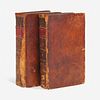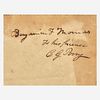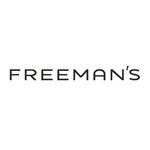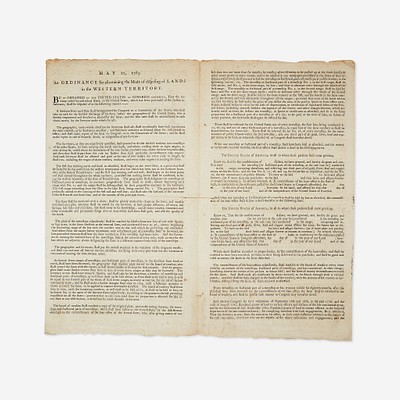[Americana] Thomas, Isaiah The History of Printing in America...
About Seller
2400 Market St
Philadelphia, PA 19147
United States
Established in 1805, Freeman’s Auction House holds tradition close, with a progressive mind-set towards marketing and promotion, along with access to a team of top experts in the auction business. And now with offices in New England, the Southeast, and on the West Coast, it has never been easier to ...Read more
Two ways to bid:
- Leave a max absentee bid and the platform will bid on your behalf up to your maximum bid during the live auction.
- Bid live during the auction and your bids will be submitted real-time to the auctioneer.
Bid Increments
| Price | Bid Increment |
|---|---|
| $0 | $25 |
| $500 | $50 |
| $1,000 | $100 |
| $2,000 | $200 |
| $3,000 | $250 |
| $5,000 | $500 |
| $10,000 | $1,000 |
| $20,000 | $2,000 |
| $30,000 | $2,500 |
| $50,000 | $5,000 |
| $100,000 | $10,000 |
About Auction
Feb 17, 2022
Freeman’s February 17 Books and Manuscripts auction is an Americana collector’s delight, with highlights led by an extremely rare Northwest Territory Land Ordinance from 1785. Curated by Darren WInston, Head of the Books and Manuscripts Department at Freeman's. Freeman's info@freemansauction.com
- Lot Description
[Americana] Thomas, Isaiah The History of Printing in America...
Worcester: Isaiah Thomas, 1810. In two volumes. First edition. 8vo. 487; 576 pp. Illustrated with five engraved plates (four folding). Contemporary sheep, red morocco spine labels, stamped in gilt, extremities and spines worn; gift inscription of Thomas's grandson, Benjamin Franklin Thomas (1813-78), on each front free endpaper, as well as his signature on title-page in first volume; front free endpaper of second volume starting; scattered foxing to text; quarter morocco slip case and chemises. Grolier American 29; Howes T 168; Sabin 95495; Streeter 7:4176.
Isaiah Thomas (1749-1831) was born in Boston and apprenticed to printer Zechariah Fowle, with whom he formed a partnership in 1770. They published the Massachusetts Spy, but after three months, Thomas continued the publication alone. The royal governor ordered the attorney general to prosecute Thomas for his Whig views, but the grand jury refused to indict him. In 1774, Thomas published the Royal American Magazine for a short time. Three days before the Battle of Concord, in which he participated, Thomas moved his presses from Boston to Worcester. Thomas continued publication of the Massachusetts Spy there until 1802, with gaps from 1776 to 1778 and from 1786 to 1788; published and sold books; and built a paper mill and bindery. In 1802, he transferred the business to his son. From 1775 to 1803, Thomas published the New England Almanac, which his son continued until 1819. In 1786, he was the first printer in the United States to use music type, and in 1791, he printed a folio edition of the Bible and of Isaac Watts’ Psalms and Hymns. He began a project on the history of printing in 1808, and he published it in two volumes in 1810. His grandson published a second edition in 1874. In 1812, Thomas founded what became the American Antiquarian Society, and he donated 8,000 volumes from his collection and one of the most valuable files of newspapers in the country to the Society. On his death, he bequeathed his entire library and collection of early American newspapers to the American Antiquarian Society.
Signed by Thomas’s grandson, Benjamin Franklin Thomas (1813-1878) who was a member of the United States House of Representatives from Massachusetts and an associate justice of the Massachusetts Supreme Judicial Court.
Benjamin F. Thomas
C. G. Perry
Laird U. Park, Jr. (1922-2001), Philadelphian, Americana collector
Sotheby’s New York, 29 November 2000, lot 348
- Shipping Info
-
No lot may be removed from Freeman’s premises until the buyer has paid in full the purchase price therefor including Buyer’s Premium or has satisfied such terms that Freeman’s, in its sole discretion, shall require. Subject to the foregoing, all Property shall be paid for and removed by the buyer at his/ her expense within ten (10) days of sale and, if not so removed, may be sold by Freeman’s, or sent by Freeman’s to a third-party storage facility, at the sole risk and charge of the buyer(s), and Freeman’s may prohibit the buyer from participating, directly or indirectly, as a bidder or buyer in any future sale or sales. In addition to other remedies available to Freeman’s by law, Freeman’s reserves the right to impose a late charge of 1.5% per month of the total purchase price on any balance remaining ten (10) days after the day of sale. If Property is not removed by the buyer within ten (10) days, a handling charge of 2% of the total purchase price per month from the tenth day after the sale until removal by the buyer shall be payable to Freeman’s by the buyer. Freeman’s will not be responsible for any loss, damage, theft, or otherwise responsible for any goods left in Freeman’s possession after ten (10) days. If the foregoing conditions or any applicable provisions of law are not complied with, in addition to other remedies available to Freeman’s and the Consignor (including without limitation the right to hold the buyer(s) liable for the bid price) Freeman’s, at its option, may either cancel the sale, retaining as liquidated damages all payments made by the buyer(s), or resell the property. In such event, the buyer(s) shall remain liable for any deficiency in the original purchase price and will also be responsible for all costs, including warehousing, the expense of the ultimate sale, and Freeman’s commission at its regular rates together with all related and incidental charges, including legal fees. Payment is a precondition to removal. Payment shall be by cash, certified check or similar bank draft, or any other method approved by Freeman’s. Checks will not be deemed to constitute payment until cleared. Any exceptions must be made upon Freeman’s written approval of credit prior to sale. In addition, a defaulting buyer will be deemed to have granted and assigned to Freeman’s, a continuing security interest of first priority in any property or money of, or owing to such buyer in Freeman’ possession, and Freeman’s may retain and apply such property or money as collateral security for the obligations due to Freeman’s. Freeman’s shall have all of the rights accorded a secured party under the Pennsylvania Uniform Commercial Code.
-
- Buyer's Premium



 EUR
EUR CAD
CAD AUD
AUD GBP
GBP MXN
MXN HKD
HKD CNY
CNY MYR
MYR SEK
SEK SGD
SGD CHF
CHF THB
THB![[Americana] Thomas, Isaiah The History of Printing in America...](https://s1.img.bidsquare.com/item/l/1094/10945544.jpeg?t=1NcmVu)
![[Americana] Thomas, Isaiah The History of Printing in America...](https://s1.img.bidsquare.com/item/s/1094/10945544.jpeg?t=1NcmVu)












